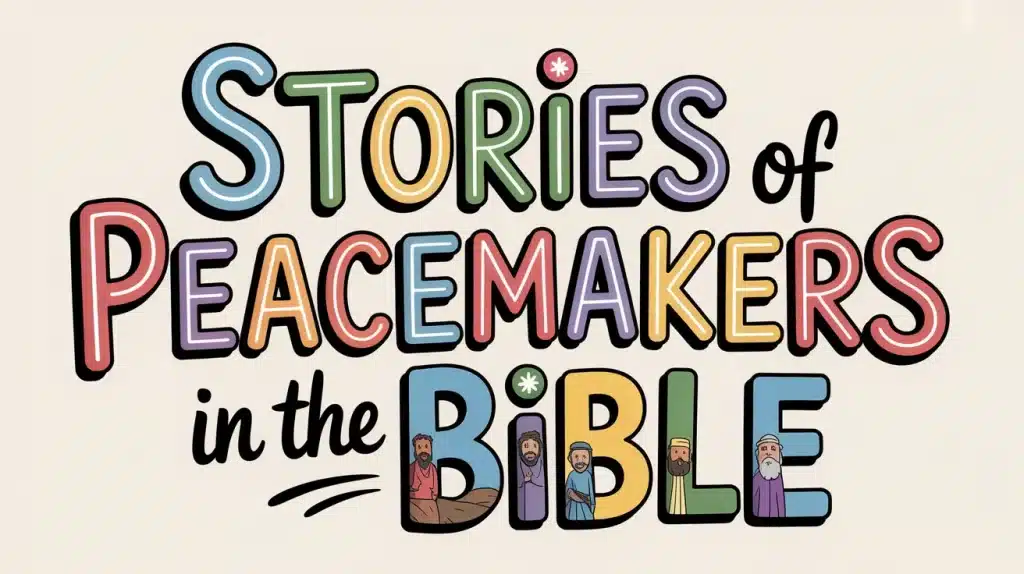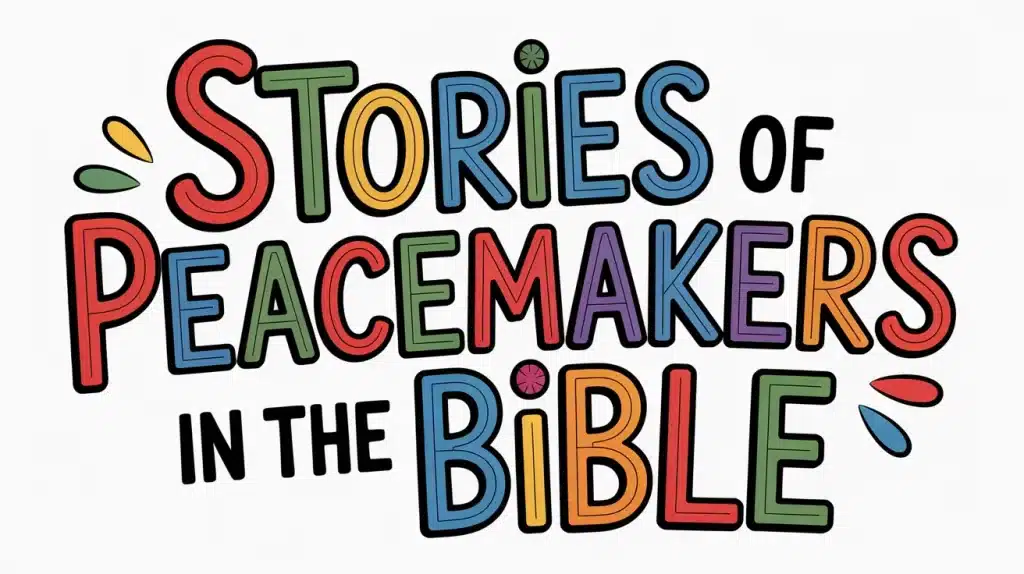5 Powerful Stories of Peacemakers in the Bible
In this article, I will be sharing with you stories of peacemakers in the Bible, stories that show how ordinary people like you and I can bring hope and calm in a world full of storms as we have seen in recent years.
Today’s story will take us through a few lives, each showing a different way to be a peacemaker. We’ll see how they used prayer, love, and courage to mend broken relationships and build walls of reconciliation. Along the way, I’ll share key moments from their journeys, highlight words that matter, and point to Bible verses that show how God calls us to peace.
Stories of Peacemakers in the Bible

Chapter 1: From Anger to Mercy: Isaiah’s Song of Peace
I remember the day I first heard about Isaiah. He wasn’t a king or a soldier; he was a man who told poetic songs to God’s people. But even in his songs, there was a message of peace. When God’s chosen people had sinned so much that they deserved punishment, Isaiah wrote these words:
“But he was pierced for our transgressions; he was crushed for our iniquities; upon him was the punishment that made us whole, and by his wounds we are healed.” (Isaiah 53:5)
This verse is one of the most powerful in the Bible. Isaiah didn’t just tell people to be nice; he showed how God’s love turns their biggest failures into opportunities for peace. He reminded them that their peace isn’t from getting revenge or ignoring pain. It comes from understanding that someone, even a suffering servant cared enough to take their wounds.
The keyword here is mercy. Isaiah’s songs weren’t sung in anger or pride. They were offered as sacrifices, showing how much God values forgiveness. When we think of peace, we often think of calm streets or quiet hearts. But biblical peace starts with seeing others as God sees them: broken, but worthy of love. Isaiah’s story teaches me that sometimes, sharing sorrow is the bravest way to sow peace.
Chapter 2: From Walls to Bridges: Nehemiah’s Reconciliation
Nehemiah’s story is one I’ve always found courageous. He wasn’t a powerful leader; he was a cupbearer, someone who brought water to the king. Yet when he heard that the walls of Jerusalem were broken, he didn’t raise a sword. Instead, he prayed.
“Now I pray to You, my God, that with great power You would have mercy on Your servants…” (Nehemiah 1:11)
This verse shows how prayer is the first step in building peace. Nehemiah didn’t wait for others to fix things. He trusted God to guide him, even when it meant facing opposition. His prayers were a way to soften hearts, both his own and the king’s.
One night, Nehemiah shared what he prayed about with the king. It wasn’t a demand; it was a humble request. The king helped him rebuild Jerusalem’s walls. But Nehemiah’s real victory wasn’t just in stone and mortar. He worked with other Jewish exiles to fix their relationships. When people were angry or distrustful, he led with humility.
“Let us rebuild the wall… and no circumstance or attack should hinder us” (Nehemiah 2:18)
This phrase, restoration, means more than rebuilding structures. It’s about restoring what’s broken in people. Nehemiah taught me that peace isn’t just about avoiding conflict; it’s about fixing what’s wrong. Sometimes, that means being the first to forgive or the last to hold a grudge. His walls stand today as a sign that when we trust God and care for others, we can turn division into unity.
Chapter 3: From Persecution to Peace: Paul’s Bold Message

Paul’s journey from persecutor to peacemaker sounds like something out of a movie. Once, he chased down Christians, looking for them to punish. But one day, the Lord appeared to him in a blinding light and said:
“Saul, Saul, why are you persecuting me?” And I fell to the ground.’ (Acts 9:4)
This verse marks a turning point. Paul’s forgiveness began not in wisdom but in surrender. He was changed by God’s grace, and that changed the world. Instead of carrying anger, he began telling people about Christ in a way that brought peace. His letters, like the one to the Romans, are full of messages about how Christ’s sacrifice unites us.
“There is therefore now no condemnation for those who are in Christ Jesus.” (Romans 8:1)
Paul’s story shows how reconciliation can come from the unlikeliest of places. He didn’t just preach peace; he lived it. Even when people didn’t accept him, he kept reaching out. He visited places where Christianity was banned, and he told jokes or shared meals to build bridges. His joy wasn’t in popularity. It was in knowing that his life was a testimony to peace through Jesus.
Paul’s life teaches me that being a peacemaker often means facing resistance. It might mean sharing the good news in a world that hates it. But Paul didn’t retreat. He wrote:
“If we live by the Spirit, let us keep in step with the Spirit.” (Galatians 5:25)
This verse reminds us that peace isn’t passive. It’s an active choice to follow God’s Spirit every day of our life.
Chapter 4: From Betrayal to Blessing: Joseph’s Forgiveness
I once heard Joseph’s story and was struck by how calmly he spoke of being sold into slavery by his brothers. He didn’t curse them. He didn’t demand revenge. Instead, he said:
“You meant to harm me, but God meant it for good…” (Genesis 50:20)
This verse changed how I see forgiveness. Providence isn’t just God’s plan for the world, it’s also His plan for our relationships. Joseph didn’t wait for his brothers to apologize. He met their pain with kindness, even after years of betrayal. His patience wasn’t passive. It was active trust in God’s timing.
Joseph’s lesson for me is that peace often requires us to see others through God’s eyes. When we hear providence in someone’s story (like Joseph’s), we’re reminded that even painful moments can have sacred purpose. It’s not about forgetting the hurt, but refusing to let it control our hearts.
Chapter 5: From Anger to Action: The Kindness of Barnabas
Barnabas’s name means "son of encouragement," and his life showed exactly why. When the early church in Jerusalem faced hardship, Barnabas didn’t just pray, he acted. He sold a field and used the money to help the believers in need.
“It was impossible for anyone to be in need among the believers, for as long as they were together…” (Acts 4:34-35)
This verse highlights generosity as a form of peace. Barnabas didn’t just give money, he gave hope. His actions showed that community isn’t built on perfection but on mutual care. When we encourage others, we’re not just lifting their spirits; we’re planting seeds of peace in a world full of division.
Barnabas taught me that peace isn’t always grand gestures. Sometimes, it’s a kind word, a helping hand, or sharing your resources. It’s about belonging to something bigger than ourselves.
What Can We Learn from These Stories?
- Peace starts with a broken heart. Isaiah, Nehemiah, and Paul all began by recognizing brokenness either in others or in themselves.
- God’s way of peace is often through others. Their journeys show that we don’t have to fix everything alone. God uses people who are willing to care.
- Prayer is armor, not just a wish list. Nehemiah’s prayer wasn’t about getting what he wanted. It was about aligning his heart with God’s.
- Forgiveness is brave. Joseph’s story proves that letting go of hate is one of the hardest but most powerful things we can do.
- Encouragement changes lives. Barnabas showed that lifting others up can prevent conflict and build unity.
Check Out “The Prodigal Son: A Journey Home”
If you enjoyed these stories, I’d love to tell you about another. It’s the story of a father whose arms were open to his lost son, much like how God’s arms are open to us. This story showed how love and repentance created an atmosphere of peace in a family.
Leave a Reply

Related Posts